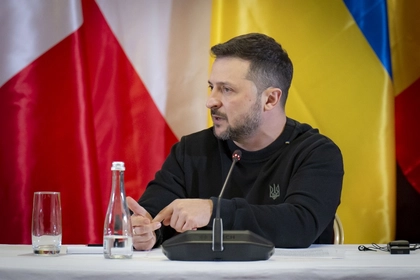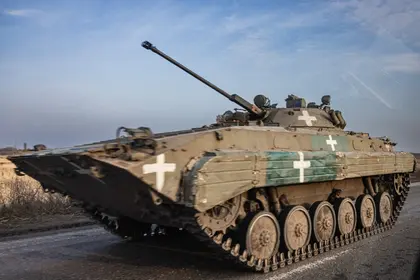Perched on the nose of the Soviet-designed tank near the Donetsk front line, one soldier in Ukrainian commander Maksym’s brigade was cradling a can of kitten food repurposed as a paraffin candle.
The servicemen under Maksym’s command have relied on these kinds of innovative -- if precarious -- fixes to stay warm in the belly of tanks like the T-64, one of several ageing models that make up Ukraine’s arsenal.
And if lobbying in Kyiv for newer, more advanced armour from its Western allies is successful, one improvement his crews are hopeful for is proper heating.
But, Maksym conceded: “The cold is the least of our worries.”
“The situation is very difficult, the equipment breaks” and there is not enough ammunition, he told AFP, speaking under snowfall.
Nearby, a young repairman worked under a tank in the frozen mud carved into deep ravines by tank tracks on a road leading to the front.
“We have no spare parts to maintain the tanks and the tracks break, so if our maintenance brigade sees tanks that have been hit they take what they need.”
- ‘Lives are our priority’ -
The brigade showed AFP a series of tanks near Lyman -- a now war-scarred city retaken from Russia in October that is still near heated battle lines, as Kyiv was repeating pleas for modern armour.
Foreign Minister Dmytro Kuleba this week again pressed Western allies, which have funnelled military aid, including artillery, air defence systems and infantry fighting vehicles to Ukraine.

Zelensky Criticizes G20’s Weak Position on Russian Invasion
A spotlight has been on German-made Leopard battle tanks, which Poland has said it is ready to provide but only with Berlin’s green light.
These more advanced tanks have upgrades to their Soviet counterparts, explained Captain Volodymyr Tchaikovsky, 54, but none so important as where ammunition is stored.
“In the Soviet tank, the crew is sitting on the ammunition, so if the tank is hit, it almost means 100 percent of the crew is dead,” he said, comparing that with the Leopard, where ammunition is stored behind a protective panel instead of in the compartment.
“We are first and foremost interested in the safety of our crew and their lives are our priority. Equipment can be replaced but not the crew,” said Tchaikovsky.
“It’s the main reason why we need Western tanks. Everything else: GPS, night vision, thermal vision ... comes second,” he said, listing key attributes of armour on his wish list.
- Not a ‘silver bullet’ -
Mark Cancian, senior advisor for the Center for Strategic and International Studies’ International Security Program, underscored this feature as well.
He said that while to some that’s “a design defect” because it makes the tank larger and provides a bigger target, it’s a “trade off” -- one the Ukrainians appear all for.
Cancian said the newer tanks also have better mechanisms for finding targets and hitting them at longer range compared to those used by Russia and Ukraine.
These controls can be retrofitted onto the T-72, which make up the bulk of the some 700 tanks Ukraine had when Russia invaded in February last year, according to Cancian.
Those refittings might be a better priority for Ukraine, he added, highlighting that the reported number of Leopard tanks that could be sent is “not going to be a silver bullet.”
Polish President Andrzej Duda said Warsaw was prepared to send a company of Leopards without specifying the exact number, during a visit to the western Ukrainian city of Lviv on Wednesday.
Ukraine state media reported that the Polish army structure indicates a tank company has 14 tanks.
With that number, and even if tens more are sent, Cancian said, “the symbolism is much more important than the actual military capability.”
The Kremlin has argued that further Western donations of weapons would change nothing, and only prolong the fighting.
But for Tchaikovsky, whose 25-year-old son is a first lieutenant in his battalion, the backing means everything.
“If we don’t receive foreign support, the conflict will drag on and there will be more losses,” he said.
You can also highlight the text and press Ctrl + Enter






